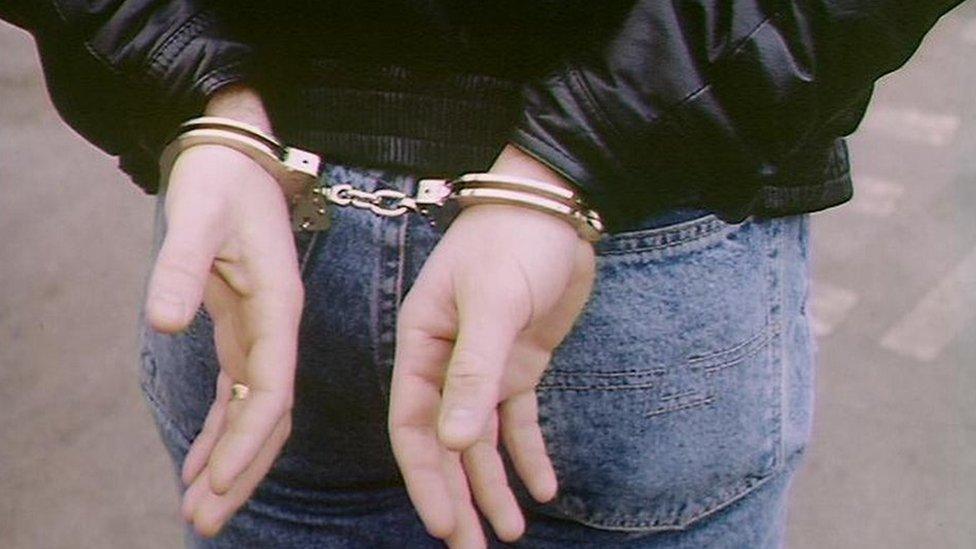Move to outlaw short jail sentences to tackle reoffending
- Published

The Scottish government says 60% of those sentenced to less than three months in jail are reconvicted within a year
Minor offenders would receive community-based punishments rather than short jail terms under plans being revived by the Scottish government.
Ministers said the move, defeated when the SNP formed a minority government, would help tackle reoffending.
Currently there is a presumption against courts imposing sentences of three months or less.
Figures showed 60% of those sentenced to less than three months were reconvicted within a year.
In 2010 the government introduced, for the first time in Scots law, a presumption against short prison sentences, except where no other punishment would be appropriate.
Consultation
Proposals to impose a six-month limit were dropped because the SNP government feared opposition parties would vote it down.
Under the law passed in 2010, the court must publicly state its reasons for imposing a short sentence.
Ministers are to launch a consultation on whether the minimum period should be extended, and by how much.
Under the proposals, offenders would serve their sentences in the community instead of being jailed, and receive help for the causes of their offending behaviour, including drug or alcohol addictions or mental health issues.
Justice Secretary Michael Matheson said although crime levels are falling, Scotland has one of the highest prison populations per capita in western Europe.
Two-thirds (66%) of those jailed in Scotland receive terms of six months or less.
Mr Mathseon said evidence has consistently shown short term prison sentences are ineffective in reducing reoffending.
"Prison will always be the right place for serious offenders who should be punished appropriately," he said.
"Short sentences do nothing to stop reoffending in our communities and only result in offenders going in and out of prison time and time again and reoffending upon release."
'Being smart'
He added: "This isn't about being 'soft' or 'tough', it is about being 'smart' and acting on the clear evidence in front of us.
"We must tackle the revolving door to our prisons and I believe these proposals will give greater protection to our communities, whilst helping offenders turn their lives around and become active and responsible citizens."
Tom Halpin, chief executive of the community safety charity Sacro, welcomed the announcement.
He said: "Simply jailing offenders for a short time does nothing to rehabilitate them, nothing to challenge their behaviour and nothing to pay back to victims for the harm they have caused.
"The proposed extension to the presumption against short sentences offers a radical and progressive step for Scotland's justice system that is needed to further reduce reoffending."
'Appropriate help'
The former first minister Henry McLeish, who chaired the Commission into the future of Scotland's Prisons in 2008, said: "The most important recommendation in my Prisons Commission Report was to introduce a presumption against short sentences of less than 6 months.
"Legislation was passed on three months and we now have the possibility of a more radical reform.
"Extending the existing presumption period could be of significant help to the prison service, provide more effective and appropriate help for those who are not a threat to society and with further investment in community alternatives, help cut reoffending.
"This is a bold and imaginative consultation paper and I hope it generates a positive response."
But the Scottish Conservatives said the move "could mean hundreds of people convicted of crimes like housebreaking, handling offensive weapons and common assault walking free".
It said the latest figures showed that more than 5,000 people were jailed for between three and six months last year.
The statistics included 874 common assaults, 184 drug crimes, 164 cases of handling an offensive weapon, and 210 housebreakings.
In 2013/14 there were even 13 occasions when attempted murder and serious assaults were dealt with by way of a custodial sentence between three and six months, along with 12 sexual assaults, the Conservatives said.
The party's justice spokeswoman, Margaret Mitchell, said: "Extending the presumption against short-term sentences simply gives offenders the impression that their crimes aren't serious enough to go to jail.
"Victims deserve a justice system that advocates for their interests instead of pandering to those of criminals. The Scottish government needs to get a grip.
"Instead of emptying our prisons, it should provide better, more widely-available rehabilitation programmes and throughcare to get the reoffending rate down, which is in everyone's interest."